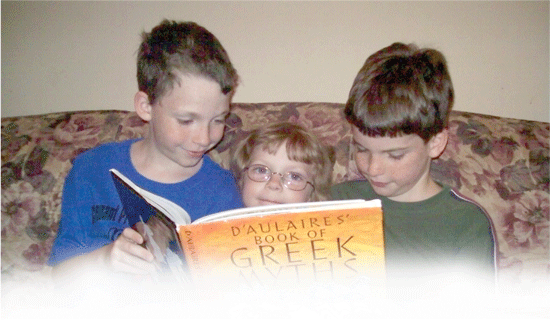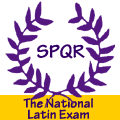
The Latin language and classical studies are making a comeback, and
three national exams are available to homeschoolers who want to
encourage the pursuit of the Classics. For students in third through
ninth grades the National Mythology Exam tests knowledge in Greek and
Roman myths. For students in first through sixth year Latin
(traditionally taken during seventh through twelfth grade of school),
the National Latin Exam gives students the chance to earn certificates
as well as silver and gold medals. There is also a new Exploratory Latin
Exam for students in third through sixth grades of school. Over the
years our children have benefitted from these tests, not only in
rewarding them for their work in homeschool, but also in teaching them
how to prepare for and take standardized exams.
I was blessed with a terrific teacher for a single year of Latin in high
school. I then went to college and forgot most of what I had learned.
When I started homeschooling I was intrigued by the Classical Christian
model. In those days, there were few Latin curricula, especially
curricula marketed to elementary-age homeschoolers. I began with a very
simple program that taught a few paradigms and a lot of basic
vocabulary. I learned alongside my students—literally turning the page
each day to see what we would learn next. We made flash cards for
vocabulary and inched through the curriculum. If any group could
demonstrate that ten minutes of study a day could add up to something,
it was our class!
As I was researching Latin resources I came upon the American Classical
League and the National Mythology Exam. One of my elementary-age
children especially enjoyed mythology and I asked her if she would like
to try it. She took the exam and realized that she had never learned how
to fill in the circles on a test form with multiple-choice questions.
(My husband laughingly pointed out that this is something homeschoolers
need to learn.) My daughter enjoyed the exam so much that she took the
exam every year thereafter until she was too old. Her little brothers
also participated. It made our visits to art museums very lively as
everyone tried to remember the details of the various myths portrayed in
art. They also pounced on allusions to mythology in literature.
 We soon added the National Latin Exam. The Latin Exam begins with an
introductory level which suited our slow-motion Latin. Once we got the
hang of it, the test provided a goal for us to reach each year. (We took
the level one and two exams two years each because we advanced so
slowly.) We finished one curriculum and started over with a new high
school level curriculum when our oldest student entered ninth grade. We
found a great benefit in going over all the basics again. We continued
taking the Latin exam each year, steadily moving up to higher levels. By
the time my first Latin class graduated from high school, we had our
second and third classes started, and I have not stopped learning Latin
yet. Along the way the American Classical League exams have been a
rewarding part of our homeschool experience.
We soon added the National Latin Exam. The Latin Exam begins with an
introductory level which suited our slow-motion Latin. Once we got the
hang of it, the test provided a goal for us to reach each year. (We took
the level one and two exams two years each because we advanced so
slowly.) We finished one curriculum and started over with a new high
school level curriculum when our oldest student entered ninth grade. We
found a great benefit in going over all the basics again. We continued
taking the Latin exam each year, steadily moving up to higher levels. By
the time my first Latin class graduated from high school, we had our
second and third classes started, and I have not stopped learning Latin
yet. Along the way the American Classical League exams have been a
rewarding part of our homeschool experience.
So how can you participate? Both exams allow for homeschool
participation, though the exams are more cost-effective if taken as a
group. This would be a good opportunity for a co-op or group of families
to work together. Also, for those who are not ready for the introductory
Latin exam, a new exploratory exam in Latin for grades 3–6 is available
through the same standing committee of the American Classical League,
“Excellence Through Classics,” which administers the National Mythology
Exam.
 For the National Mythology Exam and the new Exploratory Latin Exam, you
can visit www.etclassics.org for an application. Exams are $3 each with
a $15 shipping and handling fee. The deadline for the mythology exam
registration is the second week of January and exams are held about the
last week of February through the first week of March. The basic text
for the mythology exam is d’Aulaire’s Book of Greek Myths and Guerber’s
The Myths of Greece and Rome. Each year the exam assigns topics for the
final section and sub-tests, and gives a bibliography for these
materials. The exam contains 30 general questions and ten questions on
the assigned topic, followed by sub-tests which are only required for
students in sixth grade and above. This year grades 10–12 were admitted
to take these tests as well. The Exploratory Latin Exam has more
flexible test dates and registration. The syllabus is sent upon
registration.
For the National Mythology Exam and the new Exploratory Latin Exam, you
can visit www.etclassics.org for an application. Exams are $3 each with
a $15 shipping and handling fee. The deadline for the mythology exam
registration is the second week of January and exams are held about the
last week of February through the first week of March. The basic text
for the mythology exam is d’Aulaire’s Book of Greek Myths and Guerber’s
The Myths of Greece and Rome. Each year the exam assigns topics for the
final section and sub-tests, and gives a bibliography for these
materials. The exam contains 30 general questions and ten questions on
the assigned topic, followed by sub-tests which are only required for
students in sixth grade and above. This year grades 10–12 were admitted
to take these tests as well. The Exploratory Latin Exam has more
flexible test dates and registration. The syllabus is sent upon
registration.
The National Latin Exams are $4 for each exam plus $10 for shipping and
handling. Registration is due by the second week of January and exams
are to be administered about the second week of March. (Early
administration is available.) Proctoring the Latin exams can be
challenging because the teacher cannot be present. A neighbor or the
other parent may administer the exam, and their names should be recorded
on the registration form for both “exam administrator” and “principal.”
Also, N.B.: When the test packet arrives, it cannot be opened by the
teacher.
 The National Latin Exam has forty multiple-choice questions which must
be completed in forty-five minutes. The Introduction to Latin Exam
covers half of a Latin I curriculum. The first through sixth year exams
include grammar, comprehension, history, derivatives, mythology, culture
and questions based on a short Latin passage. You can download practice
exams, syllabi for the various levels, and registration forms at
www.nle.org. We used the practice exams as part of our daily school
(half an exam three days a week) from January to March. They are an
education in themselves.
The National Latin Exam has forty multiple-choice questions which must
be completed in forty-five minutes. The Introduction to Latin Exam
covers half of a Latin I curriculum. The first through sixth year exams
include grammar, comprehension, history, derivatives, mythology, culture
and questions based on a short Latin passage. You can download practice
exams, syllabi for the various levels, and registration forms at
www.nle.org. We used the practice exams as part of our daily school
(half an exam three days a week) from January to March. They are an
education in themselves.
My daughter, who went on to minor in Latin in college, felt that the
yearly exams gave her something to aim for in her studies. The knowledge
she gained through participation in the exams gave her an advantage in
many areas of study from art appreciation and English literature (where
mythological allusions abound) to English composition (where Latin
grammar and derivatives form the backbone of the English language.) We
also learned that by studying a little every day we could make great
progress and even earn gold medals.
On each certificate awarded by the American Classical League are the
words: Labor omnia vincit. Indeed, effort overcomes everything.
Joyce McPherson is the creator of the online programs “Homeschool Tools”
and “Shakespeare Tools,” as well as the author of a series of
biographies for Greenleaf Press. With her husband, Garth, she
homeschools their nine children. She can be reached through
Here or at mcpclan@comcast.net.